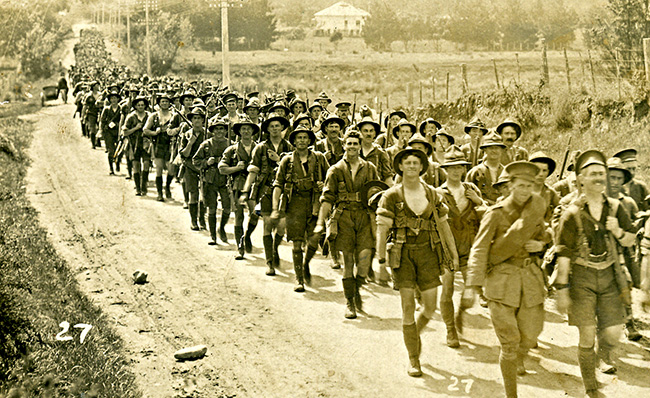 Monday 26 March 2018 10:11am
Monday 26 March 2018 10:11am
Soldiers in the Hutt Valley, Wellington, April 1916. Credit: Creative Commons.
For the first time, Otago researchers have identified evidence of socio-economic inequalities resulting in different death rates in New Zealand men from 100 years ago.
With the help of digitalised historical data, a University of Otago, Wellington, study of 2,406 military personnel found that men in the highest occupational classes (including company managers, doctors and teachers) lived on average 3.5 years longer than those in the three lowest classes (including mechanics and labourers).
This is the first study to suggest differences in death rates by socio-economic position in New Zealand prior to the 1960s.
Professor Nick Wilson of the University of Otago, Wellington's Department of Public health says that low socio-economic position is an important risk factor for health internationally and has been identified as the third most important risk factor for premature death.
More recent data shows that, in New Zealand, differences in life expectancy between high and low income groups are 6.5 years for men and 4.7 years for women. Ethnic health inequalities are even more marked, with a difference of 7.4 years for male life expectancy and 7.2 years for females in Maori versus non-Maori.
Professor Wilson says that prior to this study, data on the historical relationship between socio-economic position and health has been sparse in New Zealand. For example, one study of differences in height by occupational group finding that professional men were taller.
To remedy this lack of information, he and other Otago researchers set out to analyse lifespan by occupational class for New Zealand populations in the late 1800s and early 1900s.
The study, recently published in the Australian and New Zealand Journal of Public Health, looked at two cohorts. The first was based on men on the electoral roll in Dunedin from 1893 to 1902, the second used an established cohort of 2,406 male military personnel who were recruited for World War I but did not go into combat.
The first study of 259 men on the electoral roll found no substantive lifespan differences between the high and low occupational class groups.
However, the second study of military personnel classified into nine occupational classes, revealed the 3.5 year disparity in lifespan between the upper and lower classes.
Professor Wilson says the findings relating to the military personnel are consistent with historical reports of social class and wealth across New Zealand society.
He believes further research is required in the area, using larger data sets.
“Understanding the past and its legacy impacts on the present are important, but it is even more critical to focus on reducing health inequalities now.”
“Not only is this a matter of justice, but the sustained functioning of modern democracies may depend on reducing overall inequalities in incomes, wealth, education and health in a society,” he says.
In order to improve the situation in New Zealand, he highlights the need to reduce ethnic inequalities, reform tax and welfare policies, tackle health issues such as tobacco use and obesity, and use the revenue from targeted excise taxes to benefit low-income groups (such as using a future sugary drink tax to fund healthy lunches in low decile schools).
“Some of these issues are being tackled by the new Government, especially with its important focus on reducing child poverty. But for some of these issues the leadership is still far from clear.”
Publication details: 'The long history of health inequality in New Zealand: occupational class and lifespan in the late 1800s and early 1900s'. Nick Wilson, Christine Clement, Matt Boyd, Andrea Teng, Alistair Woodward, and Tony Blakely. Australian and New Zealand Journal of Public Health, 2018.
http://onlinelibrary.wiley.com/doi/10.1111/1753-6405.12765/abstract
For more information, please contact:
Professor Nick Wilson
Department of Public Health
University of Otago, Wellington
Email: nick.wilson@otago.ac.nz
A list of Otago experts available for media comment is available elsewhere on this website.
Electronic addresses (including email accounts, instant messaging services, or telephone accounts) published on this page are for the sole purpose of contact with the individuals concerned, in their capacity as officers, employees or students of the University of Otago, or their respective organisation. Publication of any such electronic address is not to be taken as consent to receive unsolicited commercial electronic messages by the address holder.
